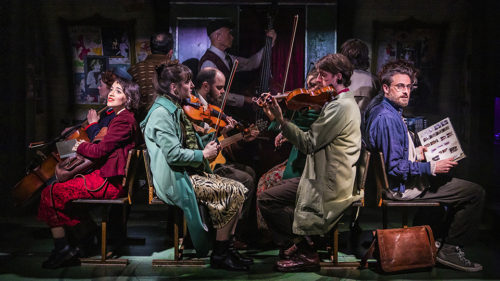Theatre review: Amélie the Musical
Watermill Theatre Company
Bristol Old Vic, 20 July 2019

I first watched the film Amélie (or Le Fabuleux Destin d’Amélie Poulain) fairly soon after it became available to rent in the UK – I think it was late-2002. I later bought the DVD and for a few years watched it often. I loved it, and its star Audrey Tautou, and its whimsical take on love and the responsibility we have to live our lives. And then I largely forgot about it.
Fast forward to this year when a friend invited me to see Amélie: the Musical. I knew nothing about this play’s Broadway background or how it would be staged, but I was pretty sure I wanted to see it. And I’m so glad I did.
This production is a joy from start to finish. The set is spectacular, the songs are beautiful (think Once but more upbeat), every member of the cast is an outstanding musician, and it all perfectly captures the tone and feel of the film without being an exact replica of the story.
We open on a Parisian street, with the cast playing instruments on stage (pianos, cellos, violins, guitar, double bass, clarinet, drums and percussion boxes) and singing about Amélie before she appears (played by Audrey Brisson). Her tale of a shuttered overprotective childhood is quickly told using a puppet, to great effect, before we arrive at that familiar Montmartre cafe where she waitresses and watches the world but doesn’t get close to anyone.
It’s both funny and sad, becoming romantic and hopeful with the appearance of Nino (played by Danny Mac, of Hollyoaks fame) – a young man who collects discarded photos from photo booths and keeps them in an album. When they lock eyes in a Metro station they clearly recognise each other as kindred spirits. But when fate gives Amélie the perfect chance to meet Nino and speak with him, she chickens out, instead leading him on a convoluted chase that she is afraid of bringing to an end.
As in the film, we learn a little about all of the characters, from Amélie’s germophobe father, to the former trapeze artist Suzanne who runs the cafe, to the sad poet Hipolito, and many more besides. Amélie does her secret good deeds for others and daydreams, usually about bizarre deaths (including a dream of her own funeral with Elton John singing a eulogy).
They all speak (and indeed sing) with French accents, the most convincing of which was Brisson’s (she’s French-Canadian) with some of the others occasionally slipping. This can make the dialogue difficult to follow at times and I wasn’t entirely convinced by this directorial decision.
But on the whole this show was a delight. The acting and the emotions are subtle while the story is not. There’s broad physical comedy and exaggerated situations, which create a fairy-tale atmosphere in a very real, specific setting.
As Craig Lucas, the stageplay writer, said in an interview, this isn’t your typical musical storyline – there’s no “I want” motivation pushing the whole thing forward. Amélie doesn’t want to be at arm’s length from the world, but she also doesn’t actively want to change the way she lives. Circumstances and other people must persuade her. That, and the style of the music, give this an indie aesthetic despite the complexity of the staging. I can see why it was critically acclaimed but not a huge hit on Broadway, but has continued life in new productions in Japan, Germany, the UK and (coming soon) Finland.
The UK tour, directed by Michael Fentiman, continues until late October so there are plenty of opportunities to catch this.
really thank you very much nice article has been